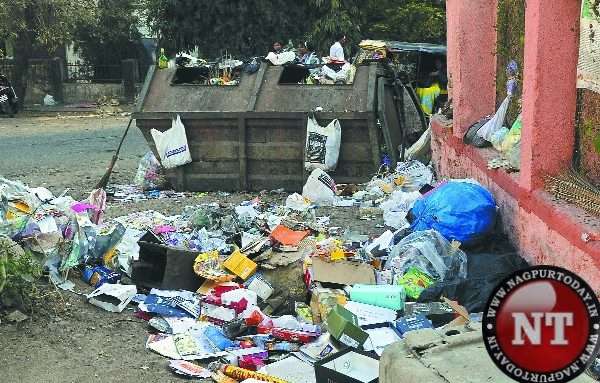Nagpur: As Prime Minister Narendra Modi’s Swachh Bharat Mission (Clean India Campaign) marked its 10-year anniversary on October 2, 2024, the nation reflects on its progress toward cleanliness. Launched in 2014 with the goal of honouring Mahatma Gandhi’s vision of a clean India, especially on his 150th birth anniversary in 2019, the campaign has seen mixed results across the country. A key question arises: Where does Nagpur, Maharashtra’s Second Capital, stand in terms of cleanliness after a decade of efforts?
Unfortunately, the answer reveals a disappointing reality. Nagpur ranked 86th nationally among 446 cities with populations exceeding one lakh in the 2023 Swachh Survekshan survey, significantly lower than expected. Within Maharashtra, Nagpur holds the 17th position. The city’s poor performance, especially in the “garbage-free city” category, has contributed to its decline in rankings. For two consecutive years, Nagpur has scored ‘0’ in this category, highlighting an ongoing struggle to manage waste effectively.
In the 2022 Swachh Survekshan, Nagpur had ranked 27th out of 47 cities with populations above 10 lakh, a clear indication of the city’s ongoing challenges in maintaining cleanliness. This year’s survey evaluated cities based on three components: service level progress, certification, and citizens’ voice, with a total of 9,500 marks available. Nagpur’s performance across these categories paints a concerning picture.
Out of 4,830 marks, Nagpur scored 3,260.66 (51%), assessed based on data provided by Nagpur Municipal Corporation (NMC) and official documentation. The city fared slightly better, scoring 1,778.14 out of 2,170 marks (26%), reflecting citizen engagement and feedback.
The most alarming score came in the certification category, where Nagpur earned only 1,125 out of 2,500 marks (23%), based on the city’s garbage-free city star rating, Open Defecation Free++ (ODF++) status, and water+ certification.
The root causes of Nagpur’s cleanliness issues are twofold. First, a segment of the city’s population remains indifferent to the cleanliness drive, frequently littering streets and dumping garbage in open spaces. Second, the NMC’s flawed planning and execution further exacerbate the problem, resulting in inefficiencies in waste management and urban cleanliness strategies.
Despite the Swachh Bharat Mission’s ambitious goals, Nagpur’s ranking highlights the need for renewed efforts at both the municipal and community levels to improve the city’s hygiene and waste management practices. The mission’s success ultimately depends on collective responsibility — from citizens adhering to cleanliness norms to authorities implementing effective and sustainable waste management systems.
Why garbage-free score 0?
Nagpur’s ‘garbage-free city’ (GFC) score of 0 in the Swachh Survekshan 2023 survey, for the second consecutive year, stems from multiple factors related to the city’s waste management and cleanliness infrastructure. The garbage-free city star rating is a critical part of the certification process under the Swachh Bharat Mission, and cities are judged based on their ability to handle solid waste efficiently. Nagpur’s failure to score any points in this category highlights significant shortcomings.
Nagpur has struggled with proper segregation of waste at the source. The city requires a well-functioning system where citizens separate wet, dry, and hazardous waste, but a lack of awareness and enforcement means that much of the garbage is mixed, making it difficult for efficient processing and disposal.
The Nagpur Municipal Corporation (NMC) has been unable to implement an effective system for door-to-door garbage collection and timely transportation to processing units. This results in garbage accumulation in open areas, streets, and illegal dumpsites, negatively impacting the city’s garbage-free rating.
Nagpur lacks the infrastructure needed to process and recycle the large quantities of waste it generates daily. Limited treatment facilities, recycling systems, and composting plants mean that much of the waste is left untreated or ends up in landfills.
One of the persistent problems in the city is the indiscriminate dumping of garbage in public spaces, vacant lots, and near residential areas. This not only affects cleanliness but also highlights weak monitoring and regulation by the municipal authorities.
While NMC has various plans and policies in place to manage waste, the execution has been flawed. The inability to enforce penalties for illegal dumping or encourage better waste practices contributes to the zero score in this category.
For a city to be certified as garbage-free, citizens play a crucial role in maintaining cleanliness. However, in Nagpur, the public has been largely disengaged from the campaign, and littering remains rampant due to low awareness and responsibility among residents.















